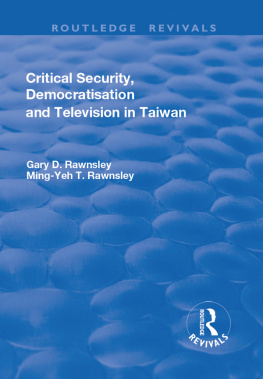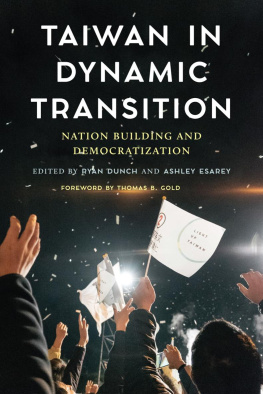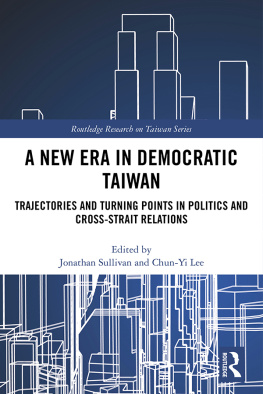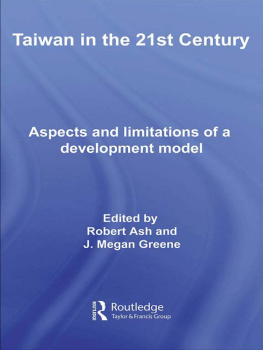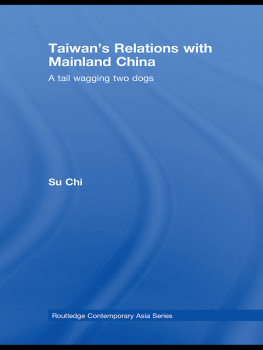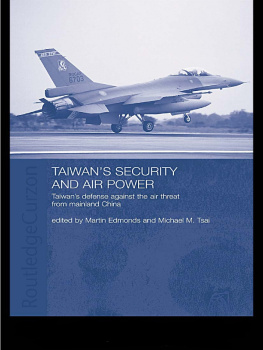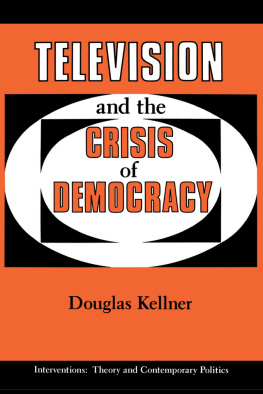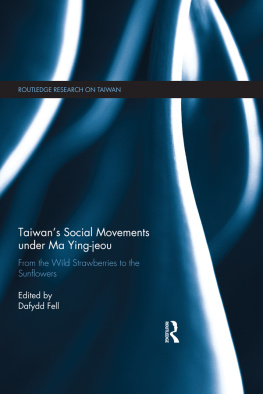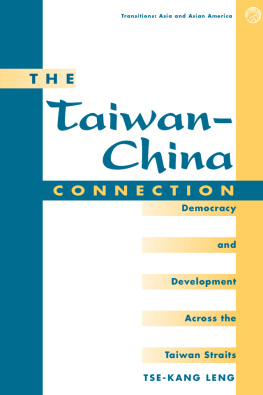CRITICAL SECURITY, DEMOCRATISATION
AND TELEVISION IN TAIWAN
Dedicated to the people of Taiwan
Democracy had been discussed in Taiwan as early as the 1950s, but replacing authoritarian rule with democracy was never inevitable.
- Myers & Wou (1998)
Other liberties are held under government, but the liberty of opinion keeps governments themselves in due subjection to their duties.
- Erskines defence of Tom Paine (Keane, 1993)
Critical Security Series
Series Editors:
Neil Renwick and Nana Poku
Editorial Board:
Richard Bedford, University of Waikato
Tony Evans, University of Southampton
Tony Mcgrew, University of Southampton
Mark Miller, University of Delaware
Robert Morrell, University of Natal
David Newman, Ben Gurion University
Peter Vale, University of Western Cape
Fiona Robinson, Carleton University
Critical Security, Democratisation
and Television in Taiwan
GARY D. RAWNSLEY
School of Politics, University of Nottingham
MING-YEH T. RAWNSLEY
Institute of Asia-Pacific Studies, University of Nottingham
First published 2001 by Ashgate Publishing
Reissued 2018 by Routledge
2 Park Square, Milton Park, Abingdon, Oxon OX14 4RN
711 Third Avenue, New York, NY 10017, USA
Routledge is an imprint of the Taylor & Francis Group, an informa business
Copyright Gary D. Rawnsley and Ming-Yeh T. Rawnsley 2001
All rights reserved. No part of this book may be reprinted or reproduced or utilised in any form or by any electronic, mechanical, or other means, now known or hereafter invented, including photocopying and recording, or in any information storage or retrieval system, without permission in writing from the publishers.
Notice:
Product or corporate names may be trademarks or registered trademarks, and are used only for identification and explanation without intent to infringe.
Publishers Note
The publisher has gone to great lengths to ensure the quality of this reprint but points out that some imperfections in the original copies may be apparent.
Disclaimer
The publisher has made every effort to trace copyright holders and welcomes correspondence from those they have been unable to contact.
A Library of Congress record exists under LC control number: 2001087934
ISBN 13:978-1-138-70623-1 (hbk)
ISBN 13:978-1-315-20189-4 (ebk)
Contents
We would like to take this opportunity to thank all those people who have helped in the preparation of this book. Our first and most important acknowledgement must be reserved for Neil Renwick, the series editor and a dear friend, who encouraged us to contribute this volume. We wish him well. We also thank the editorial staff of Ashgate Publishing and especially Kirstin Howgate for taking on this project and coping with several delays brought about by both authors experiencing repeated illness. We have found Ashgate a most agreeable publisher to work with always courteous and responsive to our ideas. Thanks also to Professor David Culbert, editor of the Historical Journal of Film, Radio and Television for granting permission to revise for publication Gary Rawnsleys article Popular Protest and the Media in PreDemocratic Taiwan (14:4), which appears here as .
We have had the good fortune of discussing our ideas with many people with similar, and sometimes not so similar, interests to our own. Several for reasons that will become obvious as you read this book have expressed a wish to remain anonymous, and we respect their decision. Those whose contribution we are happy to acknowledge include the following:
The School of Politics at the University of Nottingham, and the relaunched Institute of AsiaPacific Studies under the wise leadership of our treasured friend and colleague, Professor Richard Aldrich; Professor Chen WenChun, director of the Graduate Institute of Political Science at National Sun Yatsen University, Kaohsiung, Taiwan. He and his staff made the authors very welcome during Gary Rawnsleys tenure as a visiting scholar in the summer of 2000, and were more than willing to discuss our research with us. Professor Feng Chiensan of the Department of Radio and Television, National Chengchi University, Taipei, has been a constant source of inspiration, information, criticism and warm friendship. Likewise James Tu of the China Times who was always prepared to meet us on our frequent journeys to Taipei and discuss Taiwans media from a practitioners perspective. We also acknowledge the help of sources at China Times and Formosa Television who have requested anonymity because they provided an insight into the KMT governments wiretapping and surveillance of journalists. Lu Chingwen, Wang Hsiaohsiang, and the DPP Legislators United Office also deserve our gratitude for providing us with an extraordinary amount of material. Professor Lee Wenruey has also provided encouragement, assistance, and above all, friendship. Professor John Copper of Rhodes College, Dr Steve Tsang of St. Antonys College, Oxford, and Professor Thomas Gold of the University of California, Berkeley have been a source of inspiration, advice and information.
We also need to say a special thank you to our friend Joe Shiao for responding to our constant cries of help when things went wrong with our computer; and of course we owe his wife Monica, and daughter Jie-yuin, a special debt of gratitude for allowing him to spend so much time in our home at all hours of the day and night!
On a more personal level we express our gratitude to Tsai Shenghong and Shih Tsaichin, MingYeh Rawnsleys loving parents and Gary Rawnsleys tolerant and generous parentsinlaw who always provide a home from home for us in Kaohsiung. Similarly MingYehs brother, Tsai Chunglian and his wife, Lee Hueydong for giving us the run of their apartment in Taipei. MingYehs sister, Tsai Mingchuan, her husband Sun Xiannan, and their daughter, Sun Peiling have provided companionship and many happy moments during our visits to Taiwan. Both authors also send their love and thanks to Jack and Shirley Rawnsley, Garys parents in Bradford, for just being there when we need them.
Finally, to the legions of friends in Taiwan and Nottingham who may not have had a direct input into this project but have nevertheless helped to keep us sane during its writing, we thank you all.
| AP | Associated Press |
| APEC | AsiaPacific Economic Committee |
| ASEAN | Association of South East Asian Nations |
| BBC | British Broadcasting Corporation |
| BCC | Broadcasting Corporation of China |
| BDF | Broadcasting Development Fund |
| CATV | Common Antennas Television |
| CBS | Central Broadcasting System |
| CCP | Chinese Communist Party |
| CCTV | Chinese Central Television |
| CNA | Central News Agency |
| CNN | Cable News Network |
| CPTV | Chinese Public Television |
| CSBC | Cheng Sheng Broadcasting Corporation |
| CSCE | Conference on Security and Cooperation in Europe |

